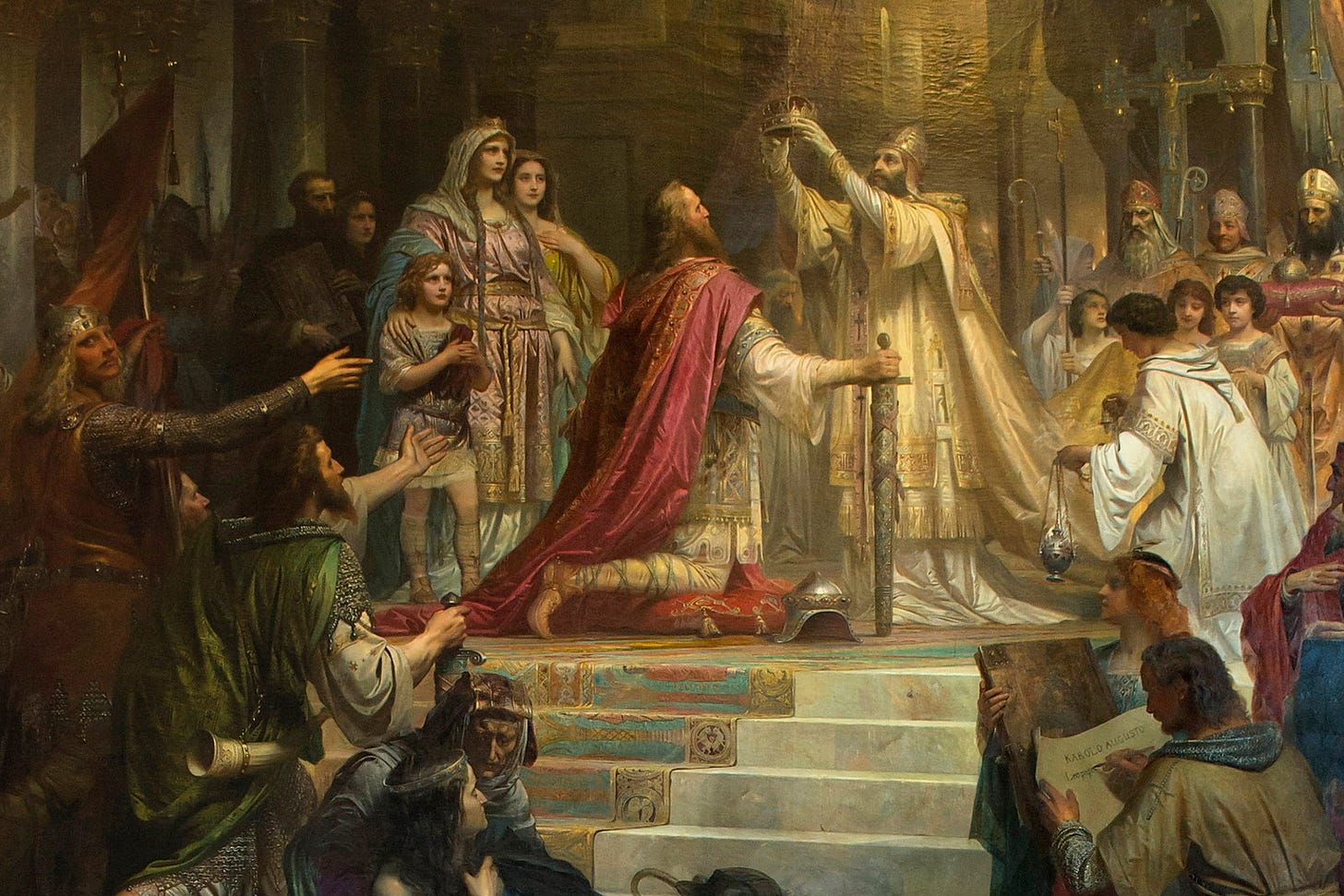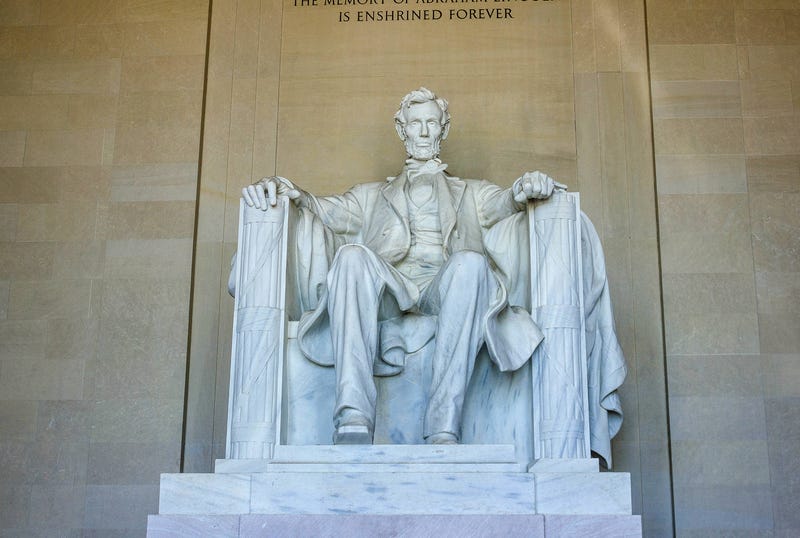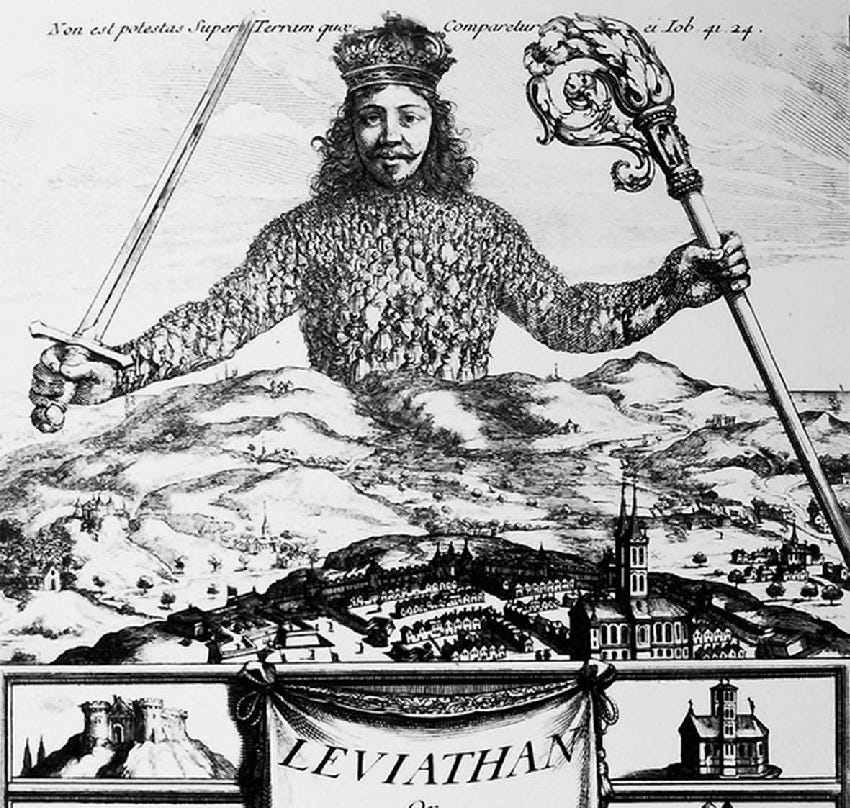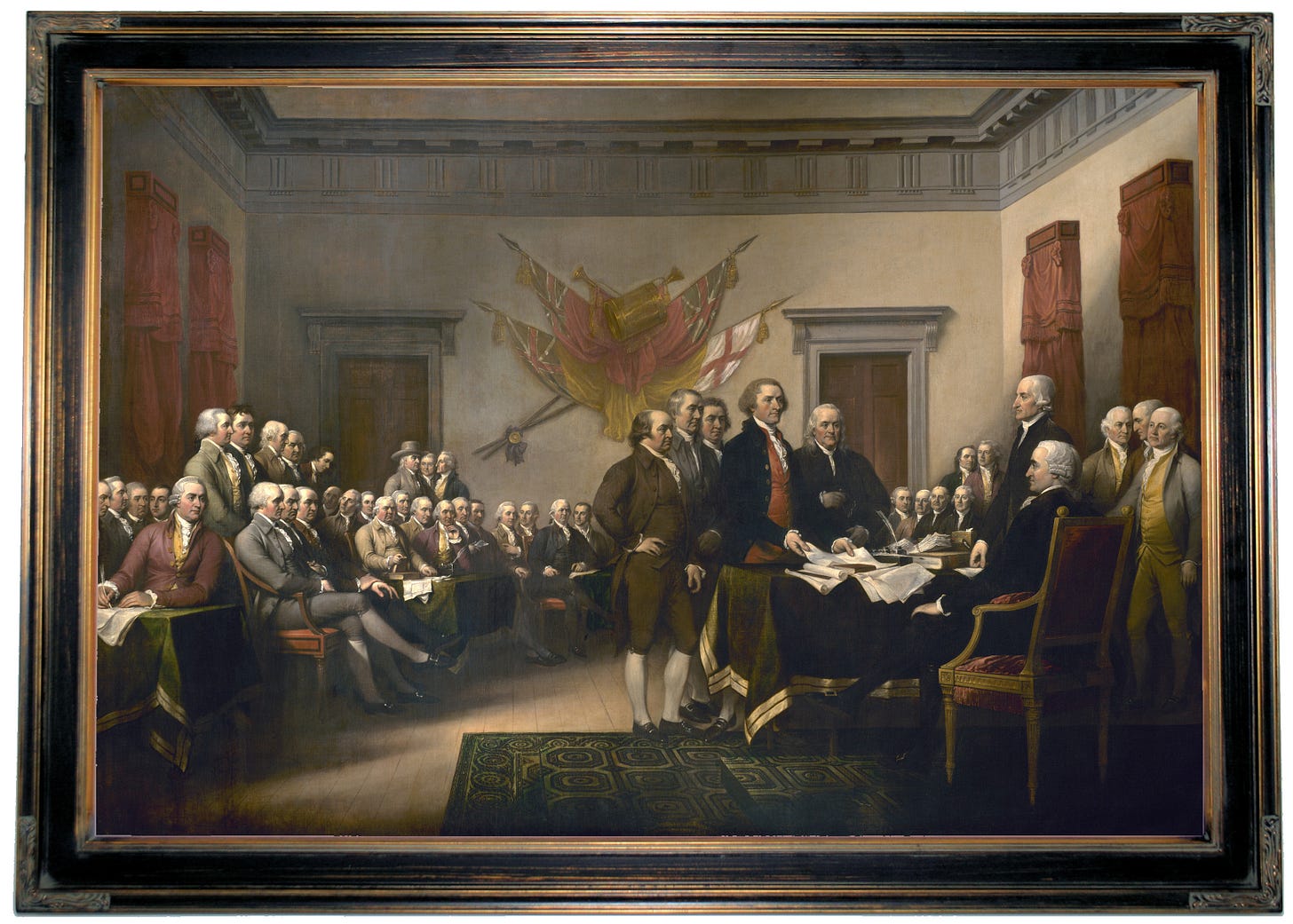The Problem of Sovereignty
Part 1: The Moral Problem
This will be the first in a series of essays on the nature of the state and the concept of sovereignty. My core contention is that the State, as we conceive it and as defined in the modern era, is a pernicious fiction. It rests, as we will see, on a nest of contradictions. The arguments for it, moral, historical and practical, all fail.
This essay began as a deep dive into Christian, specifically Catholic, political theory, examining how the mainstream interpretation defending sovereignty is incoherent and ahistorical. This version of the essay will be a bit more generic, but will still have a Christian emphasis. However, I believe most of the arguments are still relevant from a secular or even pagan perspective.
This first essay will be a look at the moral argument. In later essays I will discuss the historical argument and practical arguments, as well as arguments from authority (scripture, the Church etc for Christians.)
The Current Crisis of Authority
While the conventional orthodoxies of state legitimacy went largely unquestioned outside libertarian circles for most of the last century, recent developments have brought such questions back to the fore.
We are now living through what appears to be the near total collapse in institutional authority, particularly among younger generations. The 21st century is shaping up to be the graveyard of the modern institutions which have shaped society for the last five centuries. For a quick inventory, the 21st century so far has seen:
9/11 and the government’s disastrous opportunistic response, from the patriot act to lies about WMD to endless expensive regime change wars in far flung regions
The abuse scandal in the Catholic Church and its coverup
The 2008 financial crisis and the subsequent crony bailouts
The Snowden revelations of illegal spying which continue to this day
The internet exposed the masses to the CIA programs like MK Ultra, OPeration Mockingbird, COINTELPRO etc.
The discrediting and implosion of legacy media
Revelations of mass corporate surveillance
BLM lies and subsequent Ferguson effects
Government-permitted and NGO-funded BLM riots
General anarcho-tyranny
Mass migration against the will of the host populations
Covid
The revelation by DOGE that much of what was sold as grass roots left-wing activism is funded by tax dollars via USAID
The Epstein revelations and the subsequent obvious and blatant coverup by an administration that ran on transparency
Obviously, these trends span across institutions, but the central institution at play in all this is the State.
So many “conspiracy theories” have been proven true and so many institutions shown to be fundamentally corrupt that there appears to be no legitimacy left.
And yet, if you mention that the state is not legitimate and has no moral claim on our obedience, you will get a barrage of incoherent enlightenment slogans justifying why, akshully, we must continue to pay taxes to pedophiles because… society.
Modern man has been indoctrinated to identify the state with society itself. He has been told that “government is the thing we do together” and other such idiotic slogans. With this framing, even when the state has been shown to be a complete fraud and a violation of everything he holds sacred, modern man cannot bring himself to imagine life without it. He hears criticism of the state as such and visions of Mad Max and the histrionics of pundits about “warlords” race through his propaganda-addled brain.
He cannot admit of a principled criticism of the state, because he believes that the state is society.
Of course, as with every modern liberal orthodoxy, the opposite is true. Society is the organic bond between real people in natural relationships like family, clan and community. The state is an imaginary abstraction which justifies the predation of a rapacious cartel of pseudo-elites, and which is parasitic on the underlying natural relations which constitute society.
Defining Terms: What Is the State?
Since Machiavelli, and explicitly since Max Weber, political theorists have defined the State as the organization within society that holds a territorial monopoly on the “legitimate” use of aggressive violence (most still recognize some limited right of self-defense against non-state actors). This means the State claims rights that individuals and voluntary groups do not: the right to seize property (taxation), conscript bodies (military service), and restrict its subjects’ behavior in a myriad of ways.
All modern states meet this definition or are vassals of states who do. Often people new to the argument about the legitimacy of the State will try to avoid the precision of this definition and define the State or government as something more generic. However, this simply obfuscates the issue, as the State would cease to exist without the powers enumerated above. Indeed, they are its distinguishing characteristics, which make it separate from other social institutions like the Church and voluntary organizations.
The core problem with most discourse around the legitimacy of the State is that we conflate it with civil society or law and order broadly speaking. This is because, over the last few centuries, states have usurped the functions of almost all non-state social institutions. The result is that most people have a hard time even imagining the functioning of non-state civil institutions which used to be common.
The argument against the legitimacy of the state is not an argument against civil society or natural hierarchy. Quite the opposite. As we’ll see later, the radical individualism and egalitarianism of the modern world are part and parcel of statist ideology, which has displaced natural community and hierarchy. Individualism demands the State, and the state tolerates no mediating institutions between itself and individuals.
With that caveat, let’s look at the moral problem with the State.
Pick Your Morality
Sovereignty rests on the idea that the sovereign has a right to command and the subject has a duty to obey. It is fundamentally a moral claim.
We can show that the state/sovereign in fact has no moral claim on obedience, i.e., there is no moral obligation to obey, irrespective of your moral frame. As we saw, the state claims the right to initiate force in a given territory. The core moral problem with the state lies with this claim. With regard to violence you can pick one of these moral frames:
Non-aggression. This is the basic Christian frame, based on the 5th and 7th commandment and the Christian understanding of human dignity. You do not have the right to initiate violence against others or their property. The only legitimate violence is defensive or retributive. This is also the default frame of most secular people in the West, although only explicitly drawn out by libertarian types.
Might Makes Right. This is the morality of the pagans, the Nietzscheans, etc. “Nature red in tooth and claw” and all that.
Now, you may point out that many secular people don’t necessarily hold an ironclad version of the NAP, but will make exceptions for matters of necessity. This is true, but it just moves them into the Might Makes Right category. In fact, any deviation from principled non-aggression gets us to Might Makes Right. Because exceptions mean that what is right depends on the will of whomever is deciding the exception. And this is a function of hard power. Thus, it brings us back to Might Makes Right.
From a non-aggression standpoint, the core moral contradiction for theories of sovereignty is that state formation, by definition, is impossible without unjust aggression.
On the other hand, if we embrace Might Makes Right, we still don’t have a moral obligation to obey. We just have a prudential necessity to submit until you can throw off the sovereign and assert your own power. So this morality actually leads us to the same conclusion as the NAP: I and my faction may have to tolerate a sovereign at the moment, but we have an incentive to develop our own power until such time as we can throw them off and assert our rights as we see them.
(There are also logical contradictions and practical problems which attend the Might Makes Right worldview, which we’ll see later. )
For now, let’s look at the origin of the state to show how it must act aggressively in order to exist.
The Origins of Political Authority
Catholic tradition affirms that the individual and the family are ontologically and chronologically prior to the State. As Leo XIII states in Rerum Novarum (¶12), families precede States. This is also evident from reason and history.
Less obvious to those who haven’t thought about it is the fact that civil society is also antecedent to the state. The formation of community is as natural to man as the formation of families. Families form communities organically in accordance with our social nature. As Pope Leo points out in Rerum Novarum, human beings are dependent on each other for human flourishing. Scripture affirms: “Behold how good and how pleasant it is for brethren to dwell together in unity.” (Psalms 132:1)
Society is the state of nature.
Within human society, leaders arise naturally. People ask the wise to arbitrate disputes, the eloquent to represent them, and the valiant to lead them in defence of their homes when the occasion arises. Such natural leadership roles arise from the decisions of the families and communities involved, not from any a priori right of coercion on the part of the chosen leaders.
Thus, the observation that humans live and flourish within social hierarchies is neither an explanation nor a justification for the origin of the State.
To form a State, one must assert sovereignty. That is, one person or group asserts the exclusive right to initiate force in a given territory, giving them a coercive territorial monopoly of protection and consequently taxation. This “right” supposedly displaces the natural right to self-defense and property of the people in said territory, at least in respect to their new rulers.
But how does one attain such a right? What separates the State from the mafia, or any other group of brigands, seeking to make their robbery more systematic? To answer “legitimacy” is of course circular, since that’s the very thing in question.
To quote St. Augustine in City of God:
“Justice being taken away, then, what are kingdoms but great robberies? For what are robberies themselves, but little kingdoms? The band itself is made up of men; it is ruled by the authority of a prince, it is knit together by the pact of the confederacy; the booty is divided by the law agreed on. If, by the admittance of abandoned men, this evil increases to such a degree that it holds places, fixes abodes, takes possession of cities, and subdues peoples, it assumes the more plainly the name of a kingdom, because the reality is now manifestly conferred on it, not by the removal of covetousness, but by the addition of impunity.”
And a little further on “But to make war on your neighbors, and thence to proceed to other, and through lust of domination to crush and subdue people who do you no harm, what else is this to be called than great robbery?”
The actions of the state are identical in form to the actions of a crime syndicate. The state operates on a much larger scale no doubt, and in a more organized manner, but a larger and more systematized evil is not less unjust but more.
The Hobbesian Assumption
Underlying most defenses of sovereignty is the false account of human nature and the origin of society expressed by Thomas Hobbes. Hobbes claimed that man in the “state of nature” is violent, selfish, and ungovernable. Hobbes assumes that man’s natural state is the isolated individual, who is by nature in a state of war against everyone else. This war produces a victor, who subdues the rest and becomes the sovereign. It is this sovereign who creates society by bringing all others under his dominion and bending them to his will.
As Hobbes famously asserts in Leviathan:
“During the time men live without a common power to keep them all in awe, they are in that condition which is called war; and such a war, as is of every man against every man.” He continues: “In such condition, there is no place for industry, because the fruit thereof is uncertain: and consequently no culture of the earth; no navigation, nor use of the commodities that may be imported by sea… no arts; no letters; no society; and which is worst of all, continual fear, and danger of violent death: and the life of man, solitary, poor, nasty, brutish, and short.”¹
Hobbes here contends something evidently untrue: that society is something extrinsic to man, that comes into being only through coercive action from outside.
This is in sharp contrast to the natural law approach taken by Aristotle and the Scholastics, which see man as a social animal, whose state of nature is in the polis.
The other two major Enlightenment theorists, Locke and Rousseau, though less grim in their assessments of man’s behavior in the state of nature, nonetheless share Hobbes’s fundamental error: they regard man’s natural condition as individual and pre-social, holding that society is not an organic outgrowth of human nature but a construct formed after the fact, although by voluntary agreement.
But if it is true that social order and hierarchy are natural to man, then to ask how social order and hierarchy can be brought about without coercion is as meaningless and absurd as asking how marriage and family can be brought about without coercion.
This, of course, is not to deny the legitimate role of force in human affairs after the Fall. But the contention that humans exist fundamentally in a state of conflict is evidently false. Our default mode is cooperation. The very notion of “war” assumes a pre-existing peace. Humans are not tigers. We are social animals. This is why we have language. This is why, when meeting a stranger, the humans’ first instinct is not to fight, but to speak. It is this faculty of language which sets us apart and makes evident our power of reason, which separates us from brute beasts.
Human society is at its core, a cooperative endeavor. I don’t mean this in some sort of hippie commune love not war kind of way. I mean in a very basic and practical sense, we can’t survive long without a cooperative group. We come into conflict with each other in the context of this cooperation. We disagree about roles, about status, about the partition of resources. We develop complex systems for resolving these disputes. Violence occurs downstream of all this.
Leadership also arises organically as it is needed. There will always be conflict and crime obviously. But this does not necessitate a sovereign, as humans are fully capable of punishing crime and resolving conflict through emergent norms in a decentralized manner without the formation of hegemonic central authority. As we’ll see later, proposing sovereignty as a remedy for human vice is a contradictory notion.
Having disposed of this state of nature fallacy, we are still left with the question: where does sovereignty come from? Various theories have been proposed, but they fall broadly into two categories: Social Contract Theory and Divine Right Theory. Since we’re not attacking the Christian arguments from authority today, we’ll leave Divine Right for the next essay.
Social Contract Theory
Enlightenment thinkers like Locke and Rousseau proposed that legitimate state power can arise from the consent of the governed. This is the weakest and least historical justification for the State. Obviously, no “social contract” has ever been signed by all participants, and no would-be sovereign has ever obtained the meaningful “consent of the governed.” (This was lucidly demonstrated regarding the US government by Lysander Spooner in his work No Treason: The Constitution of No Authority)
Some will appeal to democracy, but the will of the majority has no bearing on the moral status of any given action. H.L. Menken observed the foundational moral flaw of democracy when he quipped “democracy is two wolves and a sheep deciding what is for breakfast.” The democratic principle also has a logical contradiction. No one can give what he doesn’t have. If your neighbor has no prior authority over you, he cannot delegate authority to a third party. Even if the majority of a community voted to establish a “state”, that decision cannot be binding on those who did not participate or who voted no, nor can it bind future generations. So sovereignty cannot originate with any act of delegation, as imagined by Enlightenment theorists.
For a more detailed debunking of Social Contract theory, particularly for those with classical liberal priors, I’d recommend Michael Huemer’s book The Problem of Political Authority.
Those without liberal priors tend to be either neo-pagan Nietzschean types who embrace Might Makes Right, or Christian fundamentalists who embrace some version of Divine Right theory. For the latter, I’ll be writing an essay on that topic specifically, but I’d also recommend Andrew Willard Jones’s The Church Against the State.
Can Might Make Right?
A common objection to the anti-state view is to point out that discussions about abstract “rights” are ultimately futile, since rights can’t enforce themselves. Therefore force is in fact the ultimate arbiter.
Now, it is obviously true that rights can’t enforce themselves and must rather be enforced by power. But this doesn’t make power the source of rights. There’s a logical issue here, but right away you’ll notice three practical issues:
A Might Makes Right framework does not establish any moral obligation on the part of a subject to obey. It only points out that the stronger party has the ability to force their will. This also implies that anyone or any group has the right to rebel as soon as they have the ability to rebel and succeed. This leads us back to our initial assertion that political authority, as a moral concept, is illusory.
The physical strength differential between individual humans is marginal. To the point that even a very strong man is unlikely to be able to subdue multiple opponents at once. So in practice, in all human societies beyond the nuclear family, the ability to project force is itself dependent not on force but on the ability to persuade others that you have that right and that they should join you. In human politics, power is not the physical prowess of a ruler, but the combined prowess and unit cohesion of those he can convince to follow him. As such, aspirants to political power always attempt to justify themselves by appealing to some moral right, whether the “Divine Right of Kings” or the “Will of the People.” Consequently, the moral argument, independent of brute force, is of utmost importance as it directly influences how people are willing to use force in support of authority or in resisting it. Persuasion is upstream of force.
If the moral dimension didn’t matter, governments wouldn’t spend billions on propaganda campaigns and indoctrination to reinforce their legitimacy. They’d just roll the tanks. But the problem is that you have to persuade people to drive the tanks. And you also have to persuade the vast majority of the population not to drop thermite grenades onto the tanks, or kill the tankers when they get out.
The Might Makes Right question brings us up against the very nature of rights. Might cannot make right because the concept of “right” is an objective moral relation rooted in justice and natural law. When we speak of rights, we are making claims about the objective moral status of an action or omission. If I kill a person, is that action justified or not? Will other humans with the same moral frame consider me to have been justified? Confronted with this question, the human mind raises questions like “was it in self-defense?” not questions like “Were you stronger than him?” This is because we are trying to ascertain the nature of the act itself.
From a practical social and legal perspective, the purpose of a system of rights/law is to have a predictable basis on which to form society. If power is self-justifying there is no such basis. The strong man may seize property, but he cannot be secure in it. And he has no basis on which to coordinate cooperation beyond perhaps immediate kinship or however far the loot will go. To be secure he must revert to some moral framework which at least purports to justify his position on some principled ground. Thus historically we see warlords attempting to legitimate their claims by appeal to divine right, or by entering into nominally voluntary arrangements with their vassals.
A social order which is built strictly on violence can be undone or redone by violence. And in such a case, there is a perpetual incentive for those not in power to avail themselves of such means. Thus, establishing any social order on a “might makes right” basis not only fails to solve the Hobbesian problem of war of all against all, but intensifies it by making it not only legitimate, but the only possible means of obtaining the power to protect one’s interests.
Thus the Might Makes Right case fails both practically and logically to provide a basis for sovereignty.
Summary of the Moral Argument
The notion of sovereignty relies on the right of the sovereign to command and the duty of the subject to obey. However, this right cannot be established by any moral principle. Whether we take the secular non-aggression or Christian worldview or even a Might Makes Right attitude, we do not arrive at any such conclusion.
In both cases the right of the would-be “sovereign” to rule is spurious, and the right of those aggressed upon to resist is obvious.
In future essays, we’ll look at the case for the historicity of the state, the purported economic arguments for it, and the Christian arguments from authority.






https://europeanconservative.com/articles/commentary/the-only-revolution-left-monarchy-and-god-again-maga/
Current events context for some of your article on divine right 👍
The origin of man was not the individual or rational society, but the tribe. Tribes, no doubt, sometimes made peace, but they also often made war. There is much evidence of this conflict with things like mass graves or skeletons with weapon damage. As for how they arranged morality, we can't know for sure, but if it wasn't for the benefit of the tribe, they were unlikely to keep existing. So did "might make right"? If right is that which continues to exist, and wrong is that which ceases to exist, then in a Darwinian sense it no doubt did. So does "might" continue to make right? I'd say so. You can argue that people often use words to decide on things, which is true, but all that is built on the back of violence. Underpinning everything is force. Perhaps the coming AI will prove this more than anything. If people no longer need other people for their labor or force, then perhaps we will see the masks come off to reveal what truly lies beneath.